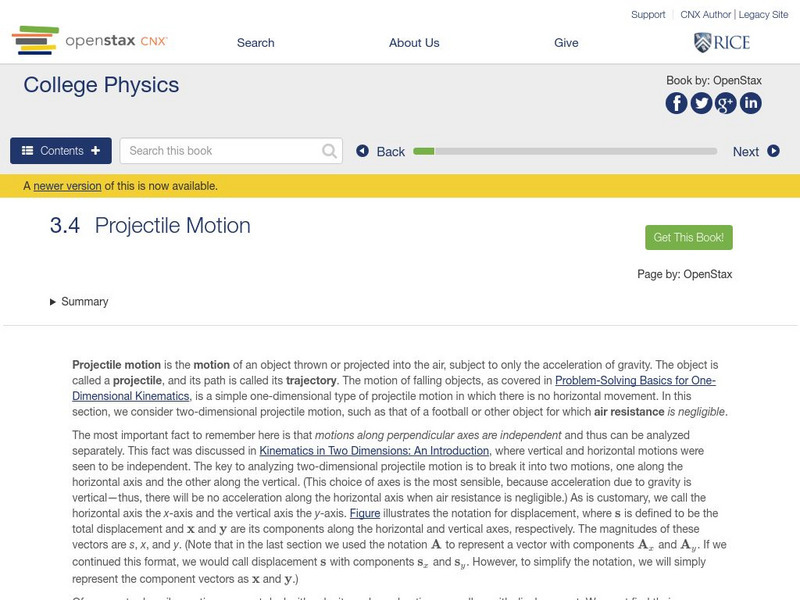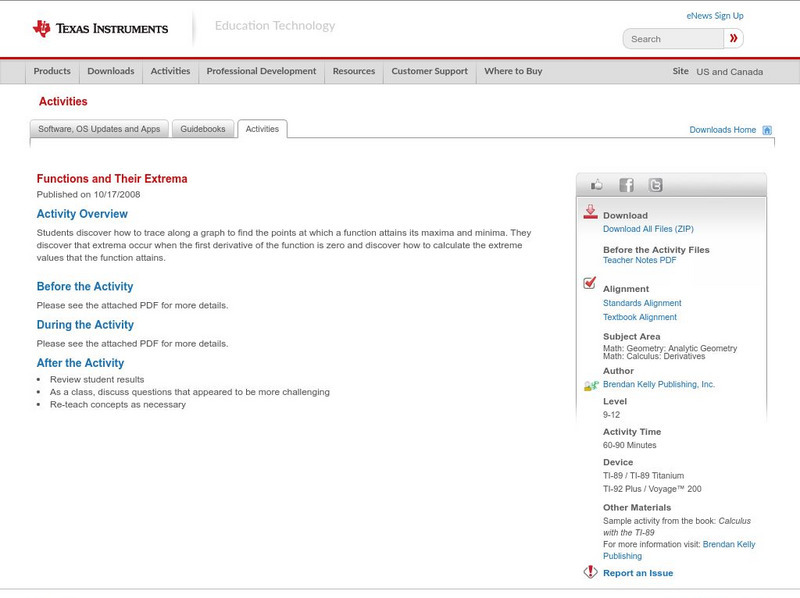Hi, what do you want to do?
Curated OER
Particle Models in Two Dimensions
In this motion worksheet, learners draw and label the trajectory of objects including the x-component and y-component of the velocity. Students calculate acceleration and speed. This worksheet has 7 problems to solve.
Curated OER
Transforming Parabolas
In this Algebra II instructional activity, 11th graders examine the affects of changing h and k in the vertex form of the parabola. The three page instructional activity provides explanation of topic, worked examples, and four...
Curated OER
The Football and Braking Distance: Model Data with Quadratic Functions
Students engage in a lesson plan that is about the concept of data analysis with the use of quadratics. They use a Precalculus text in order to give guidance for independent practice and to serve as a source for the teacher to use. The...
LABScI
Projectiles: Target Practice
Angry Birds prepared them, but now pupils must prove their skills with projectiles! Scholars test different variables to determine which ones impact the distance the projectile flies. The experiment provides connections to kinetic and...
Curated OER
Curveball vs. Fastball
Students graph the relationship between the release point and the final position of curveballs and fastballs thrown by both right and left handers given a constant speed, and explain the relationships illustrated by the graphs of data.
Curated OER
The Baseball and Air
Students use Curveball to complete the activity to determine how the speed of airstreams changes in relation to changes in the distance of the airstream from the center of the baseball.
Curated OER
Did You Catch My Drift?
Students, through the use of the Curveball interactive software package, become familiar with the way in which the flow of air across or around an object affects its ability to lift, spin, and curve. After reading the explanation given...
Curated OER
Graphing Quadratic Equations with a Coefficient of One
This is a teacher page for a lesson and does not include any materials to support the lesson. Students graph quadratic equations with a coefficient of one and create a table of values to graph a quadratic equation. They plot the values...
Curated OER
Calculating Arc Lengths of Simple Functions-I
In this calculating arc lengths instructional activity, students are given 4 simple functions and they use the Pythagorean Theorem and the basic techniques of calculus to find the arc-length formula in order to find the arc-length.
Curated OER
Linear Equations
Seventh graders explore battle plans using grids. In this linear equation activity, 7th graders see how math is used in battle. Students create a grid on the floor using tape and plastic army men to serve as the points. Students...
Curated OER
Slope Fields
Students create and analyze slope fields. In this calculus lesson, students create a visual of differential equations. They use the Ti Navigator to create slope fields.
Curated OER
Race the Track! Jump the Gap
Students record data of using a track system with variables and how those variables affect a ball used in the track. In this track lesson plan, students design their own track in groups, test the ball's rates of speed, and record their...
Curated OER
Longest Home Run
In this real-life math learning exercise, students utilize the provided trajectory equation, which is quadratic, and solve for the greatest height and farther distance. There are 2 questions.
Texas Instruments
Texas Instruments: Space Trajectories
In this activity, students will explore different models for the motion of satellites. They work with two-and three-body problems, and consider both artificial and natural satellites.
Khan Academy
Khan Academy: 2 D Projectile Motion: Vectors and Comparing Multiple Trajectories
Practice problems dealing with displacement, velocity, and acceleration vectors for horizontally launched projectiles. In these practice problems, students will compare initial speed and time in the air for multiple projectiles.
Texas Education Agency
Texas Gateway: Kinematics in Two Dimensions: Projectile Motion
By the end of this section, you will be able to identify and explain the properties of a projectile, such as acceleration due to gravity, range, maximum height, and trajectory; determine the location and velocity of a projectile at...
OpenStax
Open Stax: Projectile Motion
The following interactive helps students understan how to identify and xplain the properties of a projectile, such as acceleration due to gravity, range, maximum height, and trajectory. They will determine the location and velocity of a...
Science Education Resource Center at Carleton College
Serc: Investigating Projectile Motion: Predicting Point of Impact
Students discuss forces acting on objects in a trajectory motion. They review notes, study equations, solve projectile motion problems, and determine experimentally the impact point of a ball in projectile motion.
Texas Instruments
Texas Instruments: Functions and Their Extrema
Model the trajectory of the longest home run ever hit while studying extrema of functions on the TI-89. Another real-world problem in this activity involves minimizing the amount of tin used in a cylindrical tank. Following the worked...
Khan Academy
Khan Academy: Angled Launch Projectile Vectors
Can you predict how the components of projectile's velocity and acceleration change during their trajectory? This practice includes questions for students to test their problem solving skills with angled launch projectile vectors.
Physics Classroom
The Physics Classroom: Circular and Satellite Motion: Energy in Satellites
Through interactive practice problems and illustrated examples, students explore energy relationships for satellites.
Other
Taro: An Application of the Derivative
This is a somewhat lengthy site discussing applications of the derivative using a trajectory problem as a template for understanding the concept. The page begins by defining a quadratic equation given three distinct points and then...

























